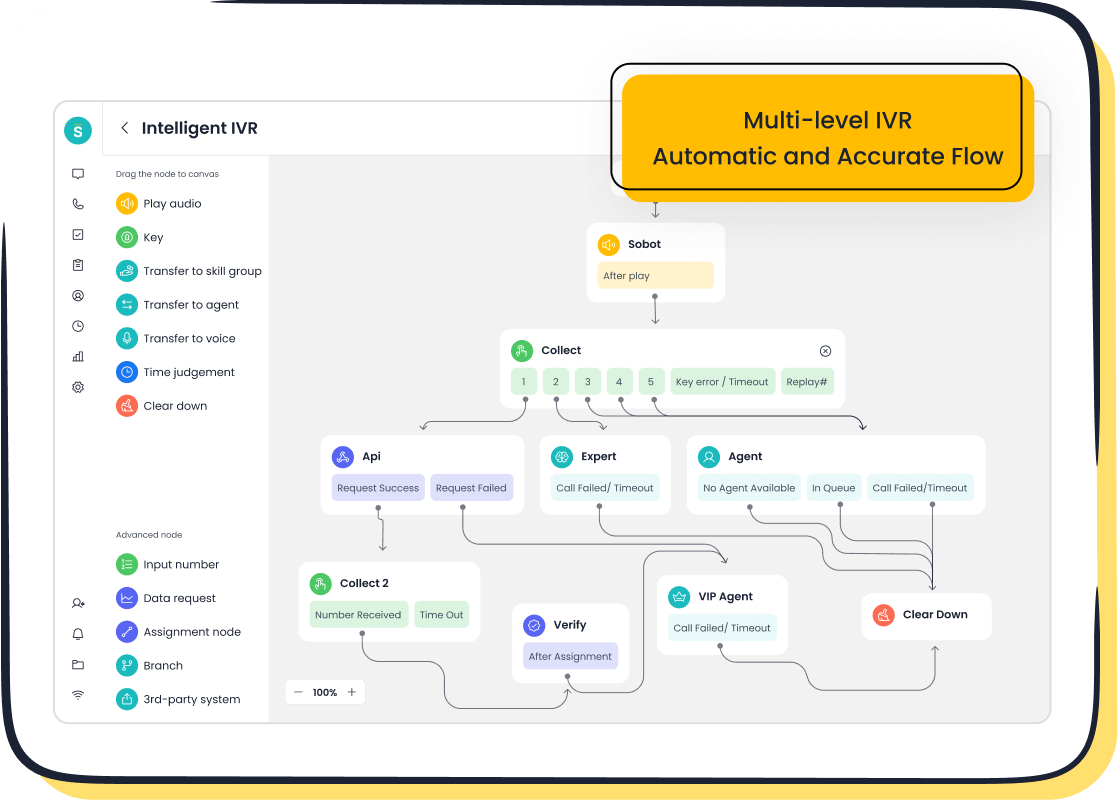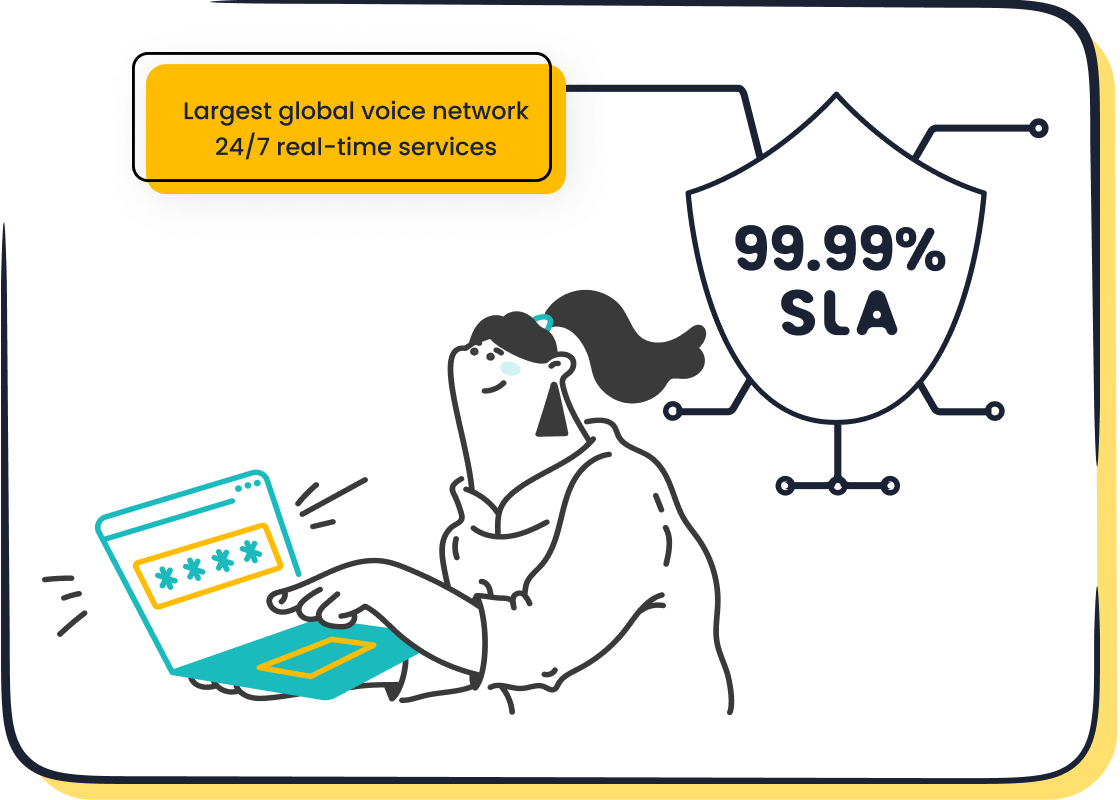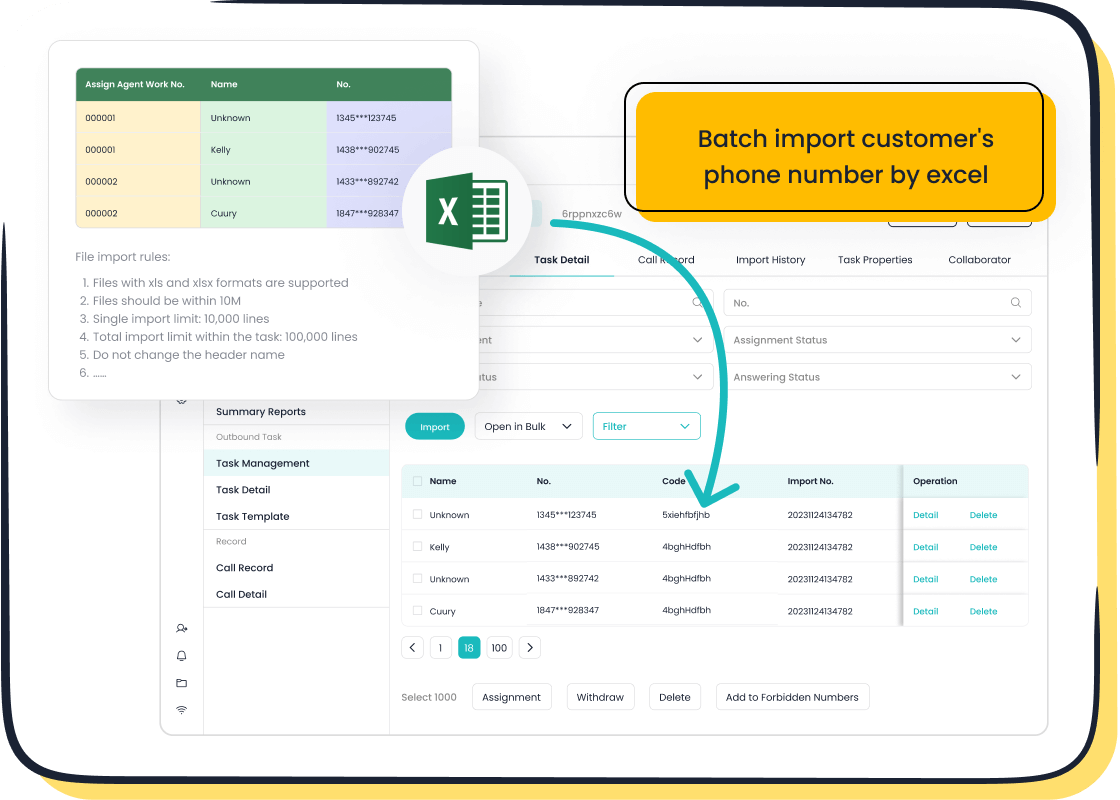Call Center Telephony Systems: Which One Fits Your Needs?

Choosing the right call center telephony systems can transform how your business communicates. Cloud-based solutions now power 75% of contact centers, offering flexibility and cost savings. Unlike traditional setups, cloud systems eliminate the need for physical infrastructure, reducing upfront costs. For businesses seeking modern solutions, Sobot provides a scalable and reliable Voice/Call Center platform. Its features, like intelligent IVR and seamless CRM integration, ensure efficient operations. With a 99.99% uptime guarantee, Sobot delivers unmatched reliability, making it a trusted choice for businesses aiming to enhance customer interactions.
Key Takeaways
- Cloud-based call center systems offer flexibility and scalability, making them ideal for growing businesses and remote work environments.
- Sobot's Voice/Call Center platform provides advanced features like intelligent IVR and seamless CRM integration, enhancing customer interactions.
- Choosing a cloud-based system can significantly reduce upfront costs, allowing businesses to allocate resources more effectively.
- With a 99.99% uptime guarantee, Sobot ensures reliability and minimizes disruptions, which is crucial for maintaining customer satisfaction.
- Traditional systems may be suitable for industries with strict data security needs, but they often come with high upfront costs and limited flexibility.
- Seamless integration with existing tools is essential; Sobot's platform connects easily with popular CRM software to streamline workflows.
- Consider your business's specific needs, such as scalability and budget, when selecting between cloud-based and traditional telephony systems.
Understanding Call Center Telephony Systems
What is a Cloud-Based Call Center Telephony System?
Definition and how it works
A cloud-based call center telephony system operates through the internet, eliminating the need for physical hardware. It allows businesses to manage calls using software hosted on remote servers. This system enables agents to handle customer interactions from anywhere with an internet connection. By leveraging cloud technology, businesses can streamline communication processes and ensure seamless operations.
Cloud-based systems rely on advanced technologies like Voice over Internet Protocol (VoIP) to route calls efficiently. These systems are designed to adapt to your business needs, offering flexibility and scalability. With no dependency on on-site infrastructure, you can focus on delivering exceptional customer service without worrying about hardware limitations.

Key features and benefits, including Sobot's Voice/Call Center capabilities
Cloud-based call center telephony systems come packed with features that enhance efficiency and customer satisfaction. Some of the key benefits include:
- Scalability: Easily adjust the system to match your business growth or seasonal demands.
- Cost-efficiency: Avoid high upfront costs by opting for a subscription-based model.
- Remote accessibility: Empower your team to work from anywhere, ensuring business continuity.
- Automatic updates: Stay up-to-date with the latest features without additional effort.
Sobot's Voice/Call Center solution exemplifies these advantages.
What is a Traditional Call Center Telephony System?
Definition and how it works
Traditional call center telephony systems rely on on-premises hardware and physical phone lines to manage calls, including PBX systems.
While traditional systems have been the backbone of call centers for decades, they often lack the flexibility and modern features of cloud-based solutions. They are best suited for businesses with existing infrastructure and specific operational needs.
Key features and benefits
Traditional systems offer certain advantages, such as:
- Control over infrastructure: You maintain full ownership and control of the hardware.
- Reliable connectivity: Operates independently of internet connectivity, reducing the risk of downtime due to network issues.
- Customizable for specific needs: Tailored to meet the unique requirements of industries with strict data security protocols.
However, these systems often involve higher maintenance costs and limited scalability compared to cloud-based options.
Key Differences Between Cloud-Based and Traditional Systems
Infrastructure and setup
Cloud-based systems eliminate the need for physical hardware. You can deploy them quickly without investing in expensive infrastructure. Traditional systems, on the other hand, require significant setup time and resources. They involve purchasing and installing hardware, which can be both time-consuming and costly.
Cost structure
Cloud-based systems operate on a subscription model, making them more budget-friendly for businesses of all sizes. You pay for what you use, which helps manage costs effectively. Traditional systems demand a high upfront investment in equipment and ongoing expenses for maintenance and upgrades.
Maintenance and updates
Cloud-based systems handle maintenance and updates automatically. Providers like Sobot ensure that your system stays up-to-date with the latest features and security measures. Traditional systems require manual updates and regular maintenance, which can strain your IT resources.
Key Factors to Consider When Choosing a System
Cost and Budget
Upfront costs vs. subscription fees
When evaluating call center telephony systems, understanding the financial commitment is crucial. Traditional systems often require significant upfront investments. These include purchasing hardware, setting up infrastructure, and hiring IT specialists for installation. For small businesses, this can strain resources. choosing a system.
Cloud-based systems, however, operate on a subscription model. You pay a recurring fee based on usage, which eliminates the need for large initial expenses. This model allows you to allocate funds more effectively, especially if your business is growing or adapting to market changes. For example, Sobot's Voice/Call Center solution offers an economical SaaS rental model, making it accessible to businesses of all sizes.
Long-term financial implications
The long-term costs of maintaining a system also differ significantly. Traditional systems demand regular maintenance, hardware upgrades, and IT support, which can accumulate over time. Cloud-based systems, on the other hand, include maintenance and updates in the subscription fee. This ensures predictable expenses and reduces the risk of unexpected costs. By choosing a cloud-based solution like Sobot, you gain access to advanced features and updates without additional charges, ensuring your system remains efficient and up-to-date.
Scalability and Flexibility
Adapting to business growth
Scalability is a critical factor when choosing a telephony system. As your business grows, your communication needs will expand. Traditional systems often struggle to scale due to hardware limitations. Adding new lines or features requires additional equipment and setup, which can be time-consuming and costly.
Cloud-based systems excel in scalability. They allow you to adjust capacity quickly, whether you're adding new agents or expanding to new markets. Sobot's Voice/Call Center platform, for instance, supports global telephony contacts and offers seamless integration with existing tools. This ensures your system grows alongside your business without disruptions.
Seasonal demand management
Seasonal fluctuations in call volume can challenge traditional systems. During peak periods, you may face bottlenecks or require temporary solutions, which can be inefficient. Cloud-based systems provide the flexibility to handle these variations effortlessly. You can scale up during busy seasons and scale down during quieter times, optimizing costs and performance. Sobot's intelligent IVR and smart call routing features further enhance efficiency, ensuring smooth operations even during high-demand periods.
Reliability and Downtime
System uptime and performance, highlighting Sobot's 99.99% SLA
Reliability is non-negotiable in call center telephony systems. Downtime can disrupt operations and impact customer satisfaction. Traditional systems rely on physical infrastructure, which can be vulnerable to hardware failures or natural disasters. Cloud-based systems, however, leverage distributed networks to ensure high availability.
Sobot guarantees a 99.99% uptime SLA, providing unmatched reliability. With 110 points of presence across 93 cities globally, Sobot ensures consistent performance regardless of location. This level of reliability minimizes disruptions and enhances customer trust.
Disaster recovery and backup options
Disaster recovery is another vital consideration. Traditional systems often require manual backups and recovery processes, which can delay restoration. Cloud-based systems offer automated backups and robust disaster recovery plans. Sobot's platform includes encrypted data transfer and secure storage, ensuring your data remains protected and accessible during emergencies. This proactive approach safeguards your operations and maintains business continuity.
Integration with Existing Tools
Compatibility with CRM and other software, including Sobot's seamless integration
When selecting call center telephony systems, compatibility with your existing tools is essential. Seamless integration ensures that your team can access customer data and manage interactions efficiently. Modern systems, like Sobot's Voice/Call Center platform, integrate effortlessly with popular CRM software. This allows you to unify customer information, streamline workflows, and enhance productivity.
For example, Sobot's solution connects with tools like Salesforce and HubSpot, enabling agents to view customer history during calls. This real-time access improves decision-making and boosts customer satisfaction. Additionally, Sobot's platform supports omnichannel communication, ensuring all customer interactions—whether through calls, emails, or chats—are centralized in one workspace. This level of integration simplifies operations and reduces the need for manual data entry.
API and customization options
APIs play a crucial role in tailoring call center telephony systems to your business needs. Sobot offers robust API capabilities, allowing you to customize workflows, automate processes, and build unique features. Whether you need to create custom reports or integrate with niche software, APIs provide the flexibility to adapt the system to your requirements.
Sobot's API documentation is user-friendly, making it easy for your IT team to implement changes. For instance, you can configure automated call routing based on customer profiles or set up triggers for follow-up actions. These customization options ensure that your telephony system aligns perfectly with your operational goals.
Ease of Use and Maintenance
User-friendly interfaces
A user-friendly interface is vital for ensuring that your team can quickly adapt to new call center telephony systems. Sobot's Voice/Call Center platform features an intuitive design that simplifies navigation and reduces the learning curve. Agents can manage calls, access customer data, and monitor performance from a single dashboard.
The drag-and-drop IVR builder is another standout feature. It allows you to create and modify call flows without technical expertise. This empowers your team to make real-time adjustments, ensuring smooth operations. By prioritizing ease of use, Sobot helps your team focus on delivering exceptional customer service rather than struggling with complex tools.
IT support and maintenance requirements
Maintenance can be a significant challenge with traditional systems. Cloud-based solutions like Sobot's eliminate this burden by handling updates and support automatically. With a 99.99% uptime guarantee, Sobot ensures that your system remains operational without interruptions.
Sobot also provides 24/7 technical support, ensuring that any issues are resolved promptly. This reduces downtime and minimizes the need for in-house IT resources. Additionally, the platform's stability and scalability mean you can rely on it to meet your business needs as they evolve. By choosing a system with low maintenance requirements, you can save time and focus on core business activities.
Pros and Cons of Each System
Pros and Cons of Cloud-Based Systems
Advantages such as scalability and remote access
Cloud-based call center telephony systems offer unmatched scalability. You can easily expand or reduce capacity based on your business needs. This flexibility is particularly beneficial for businesses experiencing rapid growth or seasonal fluctuations. For example, during peak seasons, you can quickly add more agents without worrying about hardware limitations.

Another significant advantage is remote access. Cloud-based systems allow your team to work from anywhere with an internet connection. This feature ensures business continuity, even during unexpected disruptions. With tools like Sobot's Voice/Call Center, your agents can manage calls and access customer data seamlessly, whether they are in the office or working remotely. The platform’s global telephony support further enhances its accessibility, making it a reliable choice for businesses operating across multiple locations.
Potential drawbacks like dependency on internet connectivity
Despite their advantages, cloud-based systems depend heavily on internet connectivity. A slow or unstable connection can disrupt operations and affect call quality. Businesses in areas with unreliable internet may face challenges in maintaining consistent performance. However, providers like Sobot mitigate this risk by offering a stable system with a 99.99% uptime guarantee. This ensures minimal downtime and reliable service, even in demanding environments.
Pros and Cons of Traditional Systems
Advantages such as control over infrastructure
Traditional call center telephony systems provide complete control over infrastructure. You own and manage the hardware, giving you the ability to customize the system to meet specific operational needs. This level of control is ideal for industries with strict data security requirements, such as finance or healthcare. By keeping everything on-premises, you can ensure compliance with stringent regulations.
Additionally, traditional systems operate independently of internet connectivity. This makes them a dependable option for businesses in areas with limited or unstable internet access. Their reliability in such scenarios has made them a long-standing choice for many organizations.
Potential drawbacks like high upfront costs and limited flexibility
The most notable drawback of traditional systems is their high upfront cost. Setting up the necessary hardware, including PBX systems and servers, requires a significant financial investment. Maintenance and upgrades further add to the expenses, making these systems less cost-effective in the long run.
Traditional systems also lack flexibility. Scaling up requires purchasing additional hardware, which can be time-consuming and expensive. Unlike cloud-based solutions, they do not adapt easily to changing business needs. For businesses seeking a more agile and cost-efficient option, cloud-based systems like Sobot's Voice/Call Center provide a modern alternative with features like intelligent IVR and seamless CRM integration.
Use Cases and Recommendations
When to Choose Cloud-Based Systems
Ideal for businesses prioritizing scalability and remote work
Cloud-based call center telephony systems are perfect for businesses that need flexibility and scalability. If your company is growing or operates in multiple locations, these systems allow you to expand without the hassle of installing additional hardware. You can add new agents or features with just a few clicks, ensuring your operations keep pace with your business growth.
Remote work has become a necessity for many organizations. Cloud-based systems empower your team to work from anywhere with an internet connection. This ensures uninterrupted service during unexpected events, such as natural disasters or office closures. For example, Sobot's Voice/Call Center platform supports global telephony contacts and provides seamless integration with tools like CRM software. This makes it easier for your team to collaborate and focus on delivering excellent customer service.

Suitable for startups and growing companies, with Sobot's Voice/Call Center as a key solution
This cost-effective approach allows you to allocate resources to other critical areas of your business.
Sobot's Voice/Call Center solution is an excellent choice for startups. It offers features like intelligent IVR, AI-powered voicebots, and a unified workspace, all designed to enhance efficiency. With a 99.99% uptime guarantee, Sobot ensures reliable performance, helping you build trust with your customers. The platform's scalability and ease of use make it a valuable asset for businesses aiming to grow without compromising on quality.
When to Choose Traditional Systems
Ideal for businesses with strict data security requirements
Traditional call center telephony systems are well-suited for industries that prioritize data security. If your business handles sensitive information, such as financial or healthcare data, on-premises systems provide greater control over your infrastructure. You can implement strict security measures to comply with industry regulations and protect customer information.
These systems also operate independently of internet connectivity, reducing the risk of data breaches caused by network vulnerabilities. For businesses in regions with unreliable internet access, traditional systems offer a dependable alternative. While they may lack the modern features of cloud-based solutions, their robust security makes them a preferred choice for specific industries.
Suitable for companies with existing on-premises infrastructure
If your organization has already invested in on-premises infrastructure, transitioning to a traditional system can be more cost-effective. You can leverage your existing hardware to manage calls and customer interactions. This approach minimizes additional expenses and ensures a smooth integration with your current setup.
Traditional systems also allow for extensive customization to meet unique operational needs. For example, businesses with complex workflows or specialized requirements can tailor these systems to align with their objectives. While they may require higher maintenance, their reliability and control make them a practical option for companies with established infrastructure.
Both cloud-based and traditional call center telephony systems offer unique advantages. Your choice should align with your business's priorities, such as budget, scalability, and integration needs. Cloud-based systems excel in flexibility and cost-efficiency, making them ideal for growing businesses or those embracing remote work. Traditional systems, however, provide robust control and security, suiting industries with strict compliance requirements.
For a modern and reliable solution, Sobot's Voice/Call Center stands out. It combines advanced features like intelligent IVR, seamless CRM integration, and AI-powered voicebots. With a 99.99% uptime guarantee, Sobot ensures uninterrupted operations, helping you future-proof your communication strategy. Explore how Sobot can transform your call center at Sobot Voice/Call Center.
FAQ
What is the difference between cloud-based and traditional call center telephony systems?
Cloud-based systems operate through the internet, eliminating the need for physical hardware. They offer flexibility, scalability, and remote accessibility. Traditional systems rely on on-premises hardware, requiring significant upfront investment and maintenance. Businesses seeking modern solutions often prefer cloud-based systems for their cost-efficiency and ease of use.
Key Insight: Cloud-based systems suit businesses aiming for global operations and seamless scalability.
How does Sobot's Voice/Call Center ensure reliability?
Sobot guarantees a 99.99% uptime SLA, supported by a global network with 110 points of presence across 93 cities. This ensures consistent performance and minimal downtime. The platform also includes encrypted data transfer and robust disaster recovery options to safeguard your operations.
Fact: Sobot handles over 3 million phone calls daily, showcasing its reliability and stability.
Can cloud-based systems handle seasonal call volume fluctuations?
Yes, cloud-based systems excel in managing seasonal demand. You can scale up during peak periods and scale down during quieter times. Sobot's intelligent IVR and smart call routing features optimize call handling, ensuring smooth operations even during high-demand seasons.
Example: Retail businesses often use Sobot's platform during holiday sales to manage increased call volumes efficiently.
Are cloud-based systems suitable for startups?
Sobot's Voice/Call Center offers features like intelligent IVR and AI-powered voicebots, making it a cost-effective and scalable solution for growing businesses.
Tip: Startups can leverage Sobot's SaaS rental model to allocate resources effectively while enhancing customer interactions.
How secure are cloud-based call center telephony systems?
Cloud-based systems prioritize security with features like data encryption and compliance with industry regulations. Sobot ensures secure data transfer and storage, protecting sensitive customer information. Its platform meets global security standards, making it a trusted choice for businesses.
Did You Know? Sobot serves industries like finance and healthcare, where data security is critical.
Can Sobot's Voice/Call Center integrate with existing tools?
Yes, Sobot's platform integrates seamlessly with popular CRM software like Salesforce and HubSpot. This allows you to unify customer data, streamline workflows, and enhance productivity. APIs also enable customization to meet your unique business needs.
Benefit: Integration simplifies operations, reducing manual tasks and improving efficiency.
What are the cost implications of switching to a cloud-based system?
Cloud-based systems operate on a subscription model, reducing initial expenses. Maintenance and updates are included in the fee, ensuring predictable costs. Sobot's economical SaaS rental model makes it accessible to businesses of all sizes.
Comparison: Traditional systems require high upfront investments, while cloud-based solutions like Sobot's offer long-term cost savings.
How does Sobot support remote work?
Sobot's Voice/Call Center enables agents to work from anywhere with an internet connection. Its unified workspace provides access to customer data and call management tools, ensuring seamless operations. This flexibility supports business continuity during disruptions.
Example: During the pandemic, many businesses relied on Sobot's platform to maintain customer service remotely.
What industries benefit most from cloud-based call center telephony systems?
Industries like retail, finance, gaming, and healthcare benefit significantly from cloud-based systems. These sectors require scalability, security, and integration capabilities. Sobot's platform caters to diverse industries, offering tailored solutions to meet specific needs.
Fact: Sobot serves over 10,000 brands, including well-known companies like Samsung and Michael Kors.
Why choose Sobot's Voice/Call Center over other solutions?
Sobot combines advanced features like intelligent IVR, AI-powered voicebots, and seamless CRM integration. With a 99.99% uptime guarantee and global telephony support, it ensures reliable and efficient operations. Its user-friendly interface and robust API capabilities make it a standout choice for businesses.
Explore More: Learn how Sobot can transform your call center at Sobot Voice/Call Center.
See Also
Comprehensive Overview of Omnichannel Call Center Tools
Comparative Analysis of Leading Interactive Voice Response Solutions
Essential Features to Look for in CRM Call Centers